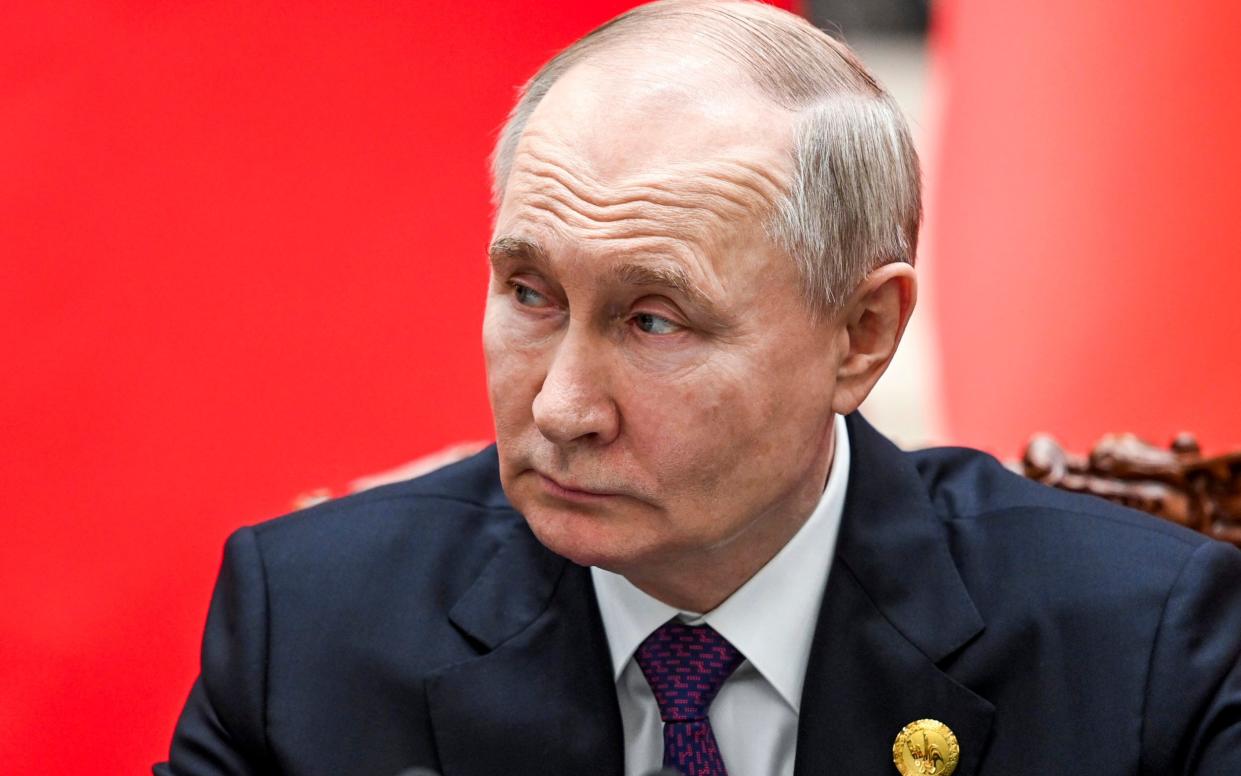Putin has drawn Nato into a trap

- Oops!Something went wrong.Please try again later.
Kyiv has been told that, before it can join Nato, it must fix its problems with corruption. These are very real: the latest Corruption Perceptions Index ranks Ukraine below Belarus and Kazakhstan. But that is not the true reason why there will be no good news on accession for Zelensky at Nato’s 75th anniversary summit in Washington next week.
The simple reality is that very few in Nato wants to let Ukraine in, despite endless platitudes including a declaration by the North Atlantic Council at Vilnius last year that “Ukraine’s future is in Nato”. There has been discussion about taking that further at the July summit, but Joe Biden vehemently opposes anything more than the meaningless formulation of “a well-lit bridge” to Nato membership. The best he is willing to do is sweeten the pill with a 10-year bilateral defence pact that changes very little and, tellingly, is cancellable with six months’ notice.
We have seen Sweden and Finland become Nato members in the blink of an eye and with no need for any kind of a bridge. That won’t happen for Ukraine. With Putin’s battles raging, all of the member states know that they would effectively be at war with Russia from the moment of Ukrainian accession.
Zelensky has been pressing for a solid guarantee of Nato membership “after the war”. But when will that be? Putin is not going to withdraw his forces, and without a surge of Western military support at a scale not so far contemplated by the West, Ukraine will not be able to push them out. That leaves an endless war or a frozen conflict at best. Whether the latter results from a negotiated settlement or battlefield paralysis, it will certainly re-ignite while Putin or anyone like him occupies the Kremlin. Well aware of that harsh reality, which Nato leader is going to sign up his country’s young men and women to fight against Russia at an unknown point in the future and potentially within his own electoral cycle?
Putin has drawn us into a trap which damns Nato if it accepts Ukraine and damns it if it doesn’t. According to US Defense Secretary Lloyd Austin “Nato is the most powerful and successful alliance in history”. But it’s overriding purpose is deterrence and despite all of its economic and military power, far greater than Moscow’s, it failed to deter Russia. Putin understood that application of strength is entirely dependent on moral and political will. His perception of the West’s weakness in those areas was amplified by Biden’s ignominious withdrawal from Afghanistan just months before he invaded, not to mention appeasement of Iranian aggression since the start of his presidency.
Putin’s war compelled the West to respond by providing unprecedented military, economic and diplomatic support as well as undertakings by Nato and its members to stand beside Ukraine for as long as it takes. That created the appearance of a cast iron bond with Kyiv, effectively an alliance. But at the same time Putin’s calculated threats of escalation deterred the US and the rest of Nato from going far enough to enable their ally’s victory.
There will be celebrations at the Nato summit about how the war has strengthened Nato, with its two new members and supposed increases in defence spending, but they will fall flat because the opposite is true. If Ukraine does not achieve victory because the alliance has failed to supply what is needed to defend a friendly neighbouring democracy then it will be another defeat for NATO. And if it is unwilling to have Ukraine as a member for fear of being drawn into direct conflict with Russia, then how likely is it that American, French, German or British leaders will be willing to send their sons and daughters to fight and die for the sovereignty of Poland or the Baltic States, even though they are Nato members?
Putin is not going to curb his imperialist ambitions in Europe, and nor will Xi Jinping in Asia or Ali Khamanei in the Middle East. To deter and, if necessary, confront these despots we need an alliance of democracies who don’t just have military power but also the real and perceived will to use it. Nato leaders would be well advised to take time at their summit to contemplate that dilemma and how their refusal to have Ukraine as a member impacts on the alliance’s credibility.

